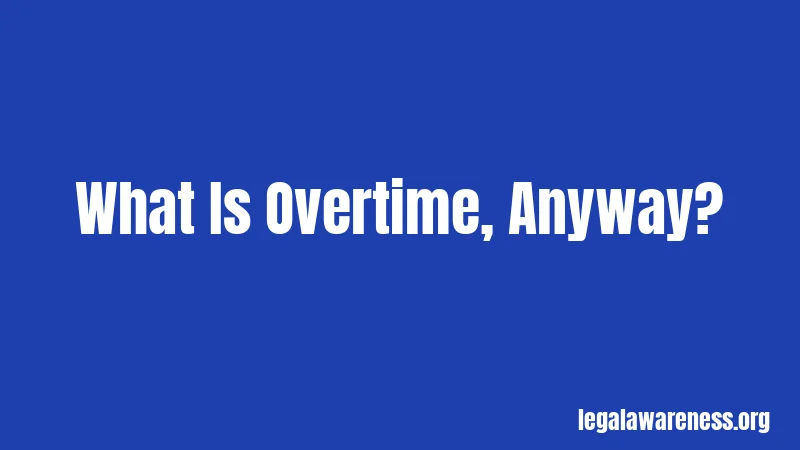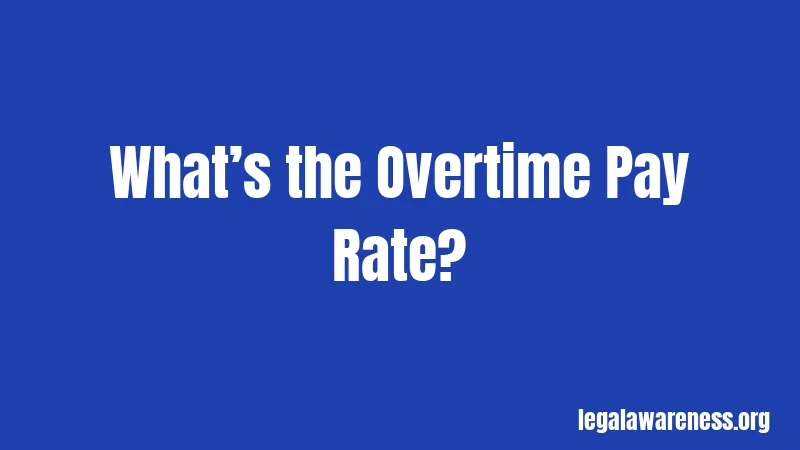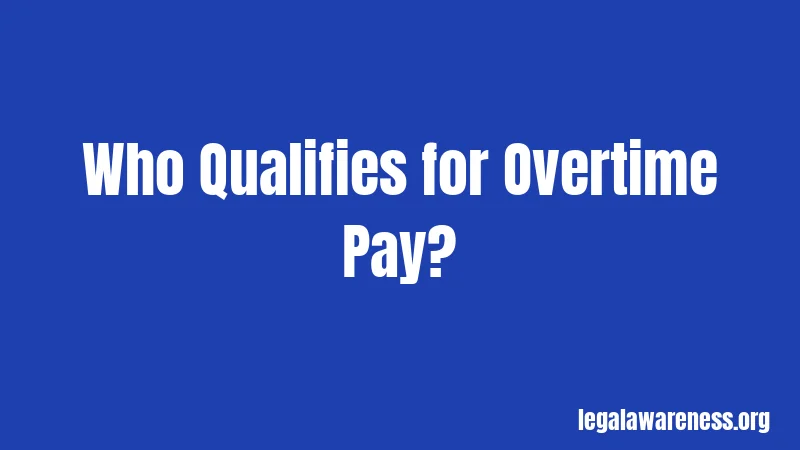Illinois Overtime Laws in 2026: What You Actually Need to Know
Most people have no idea how much money they might be leaving on the table. Seriously. If you work in Illinois, there are specific overtime rules that could affect your paycheck, and honestly, many employers don’t follow them correctly. The good news? Understanding these laws is way simpler than you’d think.
This guide breaks down everything you need to know about overtime in Illinois. We’ll cover what counts as overtime, how much you should be paid, and what happens if your employer gets it wrong. By the end, you’ll know exactly where you stand.
What Is Overtime, Anyway?

Okay, so let’s start with the basics. Overtime is when you work more than a certain number of hours in a week, and your employer has to pay you extra for that time. Think of it like this: work a standard week, get your regular pay. Work extra hours, get a bonus rate.
In Illinois, overtime rules come from two places. There’s federal law, which sets the minimum. Then there’s Illinois state law, which often gives you more protection. That’s actually good news for you. When both apply, you get whichever one pays you more.
How Many Hours Before You’re Overtime?
Here’s where things matter. In Illinois, you’re entitled to overtime pay once you hit 40 hours in a single week. That’s the magic number. Work 40 hours or less? Regular pay. Work 41 hours? That 41st hour and beyond get the overtime rate.
One important thing: it’s based on a calendar week. Illinois doesn’t care if you work those 40 hours over five days or six days. What matters is the total hours from Sunday through Saturday.
But wait, there’s more to know. Some jobs in Illinois have different rules. For example, if you work in healthcare or certain other industries, there might be slightly different thresholds. We’ll get to that in a minute.
What’s the Overtime Pay Rate?

This is the important part. In Illinois, overtime must be paid at one and a half times your regular hourly rate. So if you normally make $15 an hour, your overtime rate is $22.50 per hour.
The math seems simple, right? It usually is. But here’s where employers sometimes mess up. They have to base it on your regular hourly rate, not your base rate. That means if you get commissions, bonuses, or shift differentials, those might get factored in.
Confused about which payments count? You’re not alone. Basically, anything you regularly earn as part of your job could count toward your regular rate for overtime purposes.
Illinois Minimum Wage Affects Your Overtime
Here’s something critical. Illinois has its own minimum wage, separate from federal minimum wage. As of 2024, Illinois minimum wage is higher than the federal rate. This matters because your overtime calculation has to be based on what you actually earn.
If you earn Illinois minimum wage, your overtime pay is calculated on that amount. So if the state minimum is higher than what you’d normally earn, you get the better rate. Pretty much, this means Illinois workers get better overtime protection than workers in many other states.
The minimum wage in Illinois increases annually, too. So your overtime calculations might go up each year automatically. Stay informed about these changes.
Who Qualifies for Overtime Pay?

Now, here’s something important. Not everyone gets overtime pay in Illinois. You have to be an “eligible employee” under the law. Let me break down who qualifies and who doesn’t.
If you’re paid by the hour, you almost certainly qualify for overtime. If you’re salaried, it depends. You might still be eligible for overtime in Illinois, unlike some states. The key isn’t how you’re paid. It’s whether you’re classified as exempt or non-exempt under the law.
Exempt employees are typically managers, professionals, and certain other positions. If you work in those roles and earn enough money, you might not get overtime pay. But “might” is the key word here. Illinois rules about exemptions are stricter than federal rules.
Administrative employees, for example, need to meet specific requirements to be exempt. Just having that job title isn’t enough. You actually have to do the duties that make you exempt. Employers can’t just call you “manager” and skip the overtime.
Salaried Workers and Overtime in Illinois
This is where Illinois stands out. Many states say salaried workers don’t get overtime at all. Illinois doesn’t work that way. If you’re salaried but not truly exempt under the law, you still get overtime pay.
Say you make $50,000 a year, and you work 50 hours in a week. You might still be entitled to overtime pay for those extra 10 hours. The calculation gets a little different for salaried employees, but the protection is there.
Your annual salary gets divided by 52 weeks to find your weekly salary. Then that weekly salary gets divided by your actual hours worked to find your regular hourly rate. Then you calculate overtime from there.
Sounds complicated? It is, honestly. But here’s the takeaway: being salaried doesn’t automatically mean no overtime in Illinois.
Recent Changes to Watch Out For
Hold on, this part is important. Illinois overtime rules have been updated recently, and some changes happened in 2023 and 2024. These updates affect how overtime is calculated for certain types of workers.
One big change involves the way bonuses and extra compensation get factored into overtime calculations. The rules are actually stricter now about what employers can do. You used to see employers try to structure bonuses in ways that reduced overtime pay. Illinois made that harder.
Also, Illinois has been increasing focus on enforcement. If your employer isn’t following these rules, there are consequences. Penalties have gotten stiffer, which actually helps workers.
Another change that matters: Illinois has looked more carefully at misclassification. Employers used to sometimes classify workers as independent contractors to avoid overtime rules. State enforcement of this has increased.
What About Comp Time Instead of Overtime Pay?
Here’s a quick question you might have. Can your employer give you time off instead of paying you overtime? Short answer: generally no, not in Illinois. You need actual pay, not comp time.
Some very specific jobs in government might be different. But in the private sector, straight overtime pay is required. Your employer can’t say “You can take Friday off instead of extra pay for those 10 extra hours you worked.”
If you’ve been getting comp time instead of overtime pay, you might have a valid claim. This is actually one of the more common overtime violations employers make.
Penalties and Consequences
So what happens if your employer breaks the overtime rules? Let’s talk about that. First, you have options.
You can file a wage claim with the Illinois Department of Labor. You can also file a lawsuit against your employer. Both paths have benefits, so it depends on your situation.
If you win a wage claim or lawsuit, you’re owed the overtime pay you didn’t receive. But it doesn’t stop there. You can also get penalties. Illinois law allows for extra penalties beyond just the back pay.
In many cases, you can recover the unpaid overtime, plus an equal amount as damages. So if your employer owes you $1,000 in overtime, you might get $2,000 total. That’s a serious consequence for employers.
There are also attorney’s fees. If you hire a lawyer to help you, your employer might have to pay those fees too. This actually makes it easier to find a lawyer to help, because many will take the case knowing they can get paid from the other side.
Recordkeeping Requirements
Employers in Illinois have to keep records of your hours and pay. That’s the law. These records have to be accurate and available to you. If there’s a dispute about how many hours you worked, the employer’s records are supposed to prove it.
Here’s the thing though. If records are missing or incomplete, courts sometimes assume the employer’s records weren’t accurate. This can work in your favor if you’re trying to prove you worked overtime.
Keep your own records too. Write down your hours when you work them. If you have emails, text messages, or other evidence of when you worked, save those. Documentation helps if you ever need to make a claim.
Special Industries and Different Rules
Wait, it gets more specific. Some industries in Illinois have different overtime rules than the standard 40-hour week.
Home care workers in Illinois have different rules. Healthcare workers, even though they work irregular hours, have specific overtime thresholds. Some positions in transportation also have unique requirements.
Babysitters and domestic workers often get different treatment in many states, but Illinois is actually protective here too. Casual workers have overtime rights, which is less common than you’d think.
The best move? Figure out if your industry has specific rules. If it does, those rules might actually give you better protection.
How to Calculate Your Overtime Pay
Let’s get practical. If you want to check whether you’re being paid correctly, here’s how to do the math.
First, add up all your regular pay for a week. Let’s say you earned $600 in regular wages. Now divide that by the hours you worked at your regular rate. If you worked 40 hours, your regular rate is $15 per hour.
Next, multiply that regular rate by 1.5. That’s your overtime rate. $15 times 1.5 equals $22.50.
Now count the overtime hours. If you worked 50 hours total, that’s 10 hours of overtime. Multiply 10 hours times $22.50. That’s $225 in overtime pay.
Add the $225 overtime to your regular $600. You should get paid $825 total. If your paycheck shows less, you might not be getting paid correctly.
The calculations can get more complex if you earn bonuses or commissions. But this is the basic method. Keep it handy to check your paychecks.
Retaliation Protection for Speaking Up
Here’s something that worries people. “What if I ask about overtime and my boss gets angry?” That’s a real concern, honestly.
Illinois law protects you from retaliation. Your employer can’t fire you, cut your hours, reduce your pay, or otherwise punish you for asking about overtime pay or filing a wage claim.
If retaliation happens, that’s actually a separate legal claim. You might be able to sue for both the wage violation and the retaliation. Courts take retaliation very seriously.
That said, retaliation can be subtle. Your boss might say your performance declined, when really it’s because you asked about overtime. Document everything. Keep emails. These help prove retaliation if it happens.
How to Report a Violation
So you think there’s a problem. What do you do? You have several paths forward.
First, you can contact the Illinois Department of Labor directly. They have a wage and hour division that investigates complaints. The process is free. You don’t need a lawyer to file.
You can also hire an employment lawyer to file a lawsuit. Many employment lawyers work on contingency, meaning they don’t get paid unless you win. That makes it accessible.
Some people try talking to their employer first. Sometimes there’s just been a mistake in the payroll system. But honestly? Only do this if you feel safe and if you have documentation of the underpayment.
Documentation You’ll Need
If you decide to file a claim, here’s what helps. Bring your paystubs. Bring any employment contracts or handbooks you have. Bring time sheets if your employer provided them.
Your own records of hours are valuable too. Even if they’re informal, like text messages to a friend saying “another long day, worked till 8 PM,” these help establish what happened.
Emails about work schedules, messages about assignments, anything showing when you worked all matters. Take screenshots. Save documents. Don’t rely on your memory alone.
The more specific you can be, the better. Rather than “I worked overtime all summer,” it’s stronger to say “I worked 50 hours in the week of July 10, 60 hours in the week of July 17,” and so on.
Special Cases You Should Know About
Let’s talk about a few specific situations that trip people up.
If you work multiple jobs, each job is calculated separately for overtime. Your hours at Job A don’t count toward overtime at Job B. Each employer is responsible for their own 40-hour threshold.
If you’re a commission-only salesperson, overtime rules still apply. Your overtime calculation might be more complex because it’s based on your variable earnings. But you still get overtime.
If you’re paid daily instead of weekly, the rules adjust slightly, but the principle is the same. You’re looking at how much you earn divided by hours worked to find your regular rate.
What about unpaid breaks? Good question. Short breaks, under 20 minutes usually, have to be paid. Meal breaks of 30 minutes or more don’t. Only paid time counts toward your 40 hours.
Frequently Asked Questions
Can my boss make me work overtime, or can I refuse? Your employer can require you to work overtime in most situations. You can’t just say no. But if you do work it, you have to be paid for it. The law doesn’t let employers make you work and not pay you.
What if I’m paid tips? Does that change overtime calculations? Tips are tricky. Your regular hourly wage, before tips, is what gets used for overtime calculations. The overtime rule protects you, not the restaurant’s tip pool system.
If I’m part-time, do I get overtime? Being part-time doesn’t matter. Once you hit 40 hours in a week, you get overtime pay, even if you’re part-time. Your regular hours don’t determine this, just your weekly total.
Can a salary lower than the legal requirement affect overtime status? Illinois has salary thresholds that determine if you’re truly exempt. If you’re below that threshold, you get overtime even if you’re salaried. These thresholds change annually with state updates.
How far back can I claim unpaid overtime? Illinois law generally allows you to go back three years for unpaid wages. There are some exceptions, but three years is the standard. Don’t wait too long to file a claim.
What if my employer says “overtime isn’t available” in my department? That doesn’t matter. Employers can’t just decide overtime isn’t available. If you work over 40 hours, you get overtime pay. Period. This is one of the clearest rules.
Do vacation days or sick days count toward the 40 hours? No. Only hours you actually worked count. Paid time off is separate. You can work 35 hours and take 5 hours of vacation. That’s not 40 hours of work.
If I get a raise mid-week, which rate applies to overtime? Generally, the rate in effect when you work the hours applies. But this can be complex with bonuses and raises. If this happens, definitely ask about how it was calculated.
Final Thoughts
Here’s what you need to remember. Illinois takes overtime seriously. The law is on the side of workers, not employers. If you work over 40 hours in a week, you deserve overtime pay at one and a half times your regular rate.
Don’t let anyone tell you overtime isn’t a big deal. We’re talking about real money. Over a year, even a few hours of unpaid overtime adds up fast.
If you suspect you’re not being paid correctly, look into it. Document your hours. Check your paystubs. If something seems off, reach out to the Illinois Department of Labor or contact an employment lawyer. Most consultations are free.
You earned that money. Make sure you get paid for it. Stay informed, stay documented, and stand up for yourself.
References
Illinois Department of Labor Official Website
Illinois Wage and Hour Division Complaints
Fair Labor Standards Act (Federal Minimum)
Illinois Department of Labor – Overtime Rules
